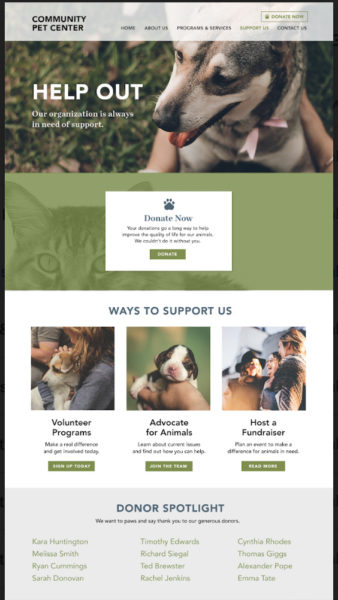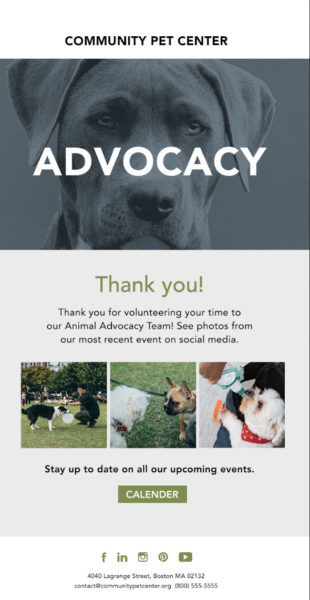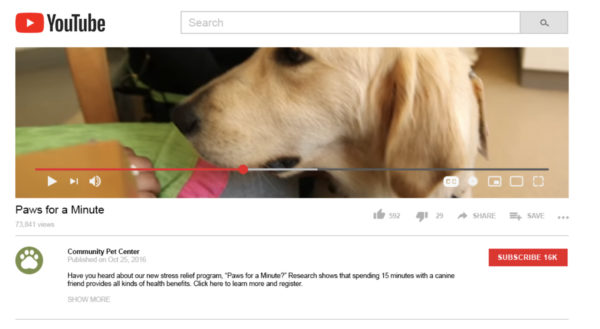
Before you figure out how to get sponsors for an event, the first question you need to ask yourself is: “What kind of event am I holding?”
There are two main kinds of nonprofit events. The first is what is known as a “friend maker,” in that the goal isn’t so much about raising money — you may even discover after the fact that you lost money in the short term. A friend maker event is designed to create relationships within the community with a long-range goal of finding donors for your nonprofit or building relationships.
The second kind of event (and the one most development teams are interested in organizing) is a fundraiser. The purpose of these events is to raise capital to support the programs and administrative costs that go into carrying out your organization’s mission.
For fundraisers to be successful, it’s essential that you secure funding from area businesses and individuals. You’ll also need a plan before you can determine how to get sponsors for an event. Asking for sponsorship for charity events can be challenging, but you can improve your odds by sticking to the following steps:
- Determine your event plan
- Create proposal options
- Identify potential event sponsors
- Honor sponsors at the event
- Follow up afterward
After we cover these steps, we’ll go over five quick tips to use when asking for event sponsorships, including how to get local businesses to sponsor your event.
But first, let’s look at some FAQs to give you a basic rundown on event sponsors.
Frequently asked questions about getting sponsors for an event
Before we dive into how to get sponsors for an event, let’s make sure we’re on the same page about the role of event sponsorship. Here are some frequently asked questions about nonprofit event sponsors.
What is an event sponsor?
A sponsor is any person or company that provides something free (money, services, products) to increase the value of your event.
Sponsors are key to your event because they add incentives that will draw people to your event.
Why are sponsors important to the success of your fundraiser?
In addition to the value they add to your event, sponsors also provide a marketing and promotional benefit. For example, if a local restaurant is providing food for your event, they should also advertise your event at their place of business.
Fundraisers and sponsorship opportunities are great business partnerships. Most companies, especially larger local businesses have a budget to do this every year. So the earlier you start mining for free stuff like goodie bags and food donations the better.
Get creative about whom you reach out to and remember that anything that adds value to your event is worth it.
When should you reach out to potential sponsors?
Usually about four months out. Plan ahead so that sponsors have enough time to go through any necessary approvals.
You also want to avoid competing with other local organizations for sponsors. The earlier you can start mining for sponsors the better off you are. We’ll go deeper into the timing of asking for sponsorship for charity events later in this article.
Who can you get to sponsor your event?
The short answer is anyone and everyone. Start with local businesses and ask your registrants if their companies want to get involved. Reach out to local restaurants for gift cards or food donations as well.
Make sure you ask friends and colleagues and then have them ask their networks and so on.
How can you get sponsors to say yes?
Getting sponsors can be stressful, especially when things don’t happen as quickly as you like. Remember to have fun, be creative, and target places you personally enjoy being a part of. If you’re a loyal customer of a local business, they will be more likely to support you.
One key to getting a “yes” is to think of creative ways to reach out to potential donors. This helps you stand out from the other organizations that are requesting sponsorships.
The first contact is always important so don’t just send a generic email to all the “info@” email addresses you find on websites. Dive in deeper and take a personal approach to make contact.
Visit a favorite local store that you support and ask if they donate or sponsor local events. Try to visit a business during off-hours so they can give you their full attention.
Make sure you reach out early and often. And don’t get disappointed if things don’t happen as fast as you’d like. Just give yourself plenty of time to accomplish your sponsorship goals.
And getting sponsors to say “yes” is what this article is all about. So read on for more tips to creating a successful event sponsorship strategy.
Before asking for sponsors, determine your event plan
Nonprofit development teams can operate on autopilot by organizing the same events annually without adjustment. However, this approach won’t help you grow your support base or get local businesses to sponsor your event. It’s best to look at each event with a fresh perspective and a new plan.
You should be able to directly connect the activity and theme of your event to the mission of your organization. For example, you may think you’ll make lots of money holding a cocktail hour, but that won’t work if your organization helps people with addiction issues.
Start by creating a message and designing a logo and name around it. Your event marketing plan should also include timelines for specific goals, so that you’ll know deadlines for printing invitations, adding sponsor names to posters, or making deposits for venues.

Delegate tasks to your team of staff and volunteers so it’s clear who’s responsible for what. Consider creating an online spreadsheet that can be easily updated so that no one accidentally approaches a business you’ve already asked for a donation.
If a volunteer is a frequent shopper at a store, have them approach the owner or manager directly. This will ensure that your message doesn’t get lost with an employee who might misunderstand or forget it.
While everyone is responsible for spreading the word and garnering support, they’ll need a game plan for understanding how to get sponsors for an event. That’s why each event plan also requires a menu of donation tiers.
Donation tiers for event sponsors
Wondering how to get local businesses to sponsor your event? Think about creating tiers so even smaller businesses can participate.
When you ask business owners in your community to support your mission, odds are they’re all going to have the same question: What’s in it for me? Make sure your team is prepared to give a compelling answer.
One way to do this is by creating what’s known as donation tiers. These are different giving levels that correspond with certain perks or rewards. Let’s say you’re organizing a black-tie gala. Your donation tiers could be:
- $500 donation gets two free tickets to the event and a listing in the program
- $1,000 donation gets the above, plus an announcement of thanks during the event
- $5,000 donation gets six tickets, an announcement, a listing, and a post on social media
- $10,000 donation gets everything a $5,000 donation receives, plus an award during the event
- $50,000 donation gets everything a $10,000 donation receives, plus naming rights for the event
Be sure to customize your tiers based on the donor’s giving history, the opportunities you can provide, and the type of event. For example, if you’re organizing a casual race in your local park, the donation tiers should be more affordable.
Try to limit the tiers to no more than four or five options. It’s easy for a potential supporter to feel overwhelmed with too many tiers — and then decide not to support you at all. For the biggest giving levels, you can limit the number of sponsors to create a feeling of exclusivity.
Many local businesses will use charity donations as an outreach tool. Make sure you know the reach of your social media platforms so that you can demonstrate the reach of the marketing partnership in the local community.
Identify potential event sponsors
An event sponsor is anyone, whether a person or a business, who is willing to provide goods, services, or a monetary donation to support your event. When deciding whom to approach for sponsorship, start by analyzing the line items in your event budget, which you should also include in your event plan. Would you like to fill a goodie bag for each participant?
Or would you be better off saving resources by getting a catering company to underwrite food costs? Do you need help with marketing costs? Perhaps a local law firm will want to donate the use of a billboard for a few months.
It’s also important to think about what businesses have a history of supporting causes like yours. It’s easier to approach a potential event sponsor if you know they care about the work you do, although you’ll likely still need to convince them by telling your organization’s story.
Honor sponsors at the event
While your donation tiers will help explain what the event sponsor will get in exchange for their donation, you’ll have greater success in determining how to get sponsors for an event if you are creative. Just because your goal is raising money doesn’t mean you can’t also cultivate relationships that can lead to even bigger asks down the road.
For example, if you plan to take pictures of the people entering your event, you could construct a backdrop with the names and logos of your top event sponsors. If you plan to give a reusable bag filled with goodies, you could print the name of your event sponsors on the bag.
Social media is an excellent way to honor your event sponsors. Post short videos from your CEO thanking new sponsors, along with brief interviews with your sponsors to explain why your cause is important to them. Publicly expressing your gratitude to each sponsor will make them more likely to keep supporting your nonprofit in the future.
Follow up afterward
If you don’t connect with your sponsors after the event, it will be more difficult to approach them the next time. Plan ahead by segmenting your email list so that you can create personalized messages for the business owners and individuals who supported your event.

Immediately after the event, let your donors know how much you raised and what that means for the community. Tag them in photos on social media so that their friends can see the partnership you’ve created.
You can also engage your new supporters throughout the year by asking them to follow you on social media and inviting them to virtual events. Over time, this will increase engagement with your donor pool and attract new sponsors for future events.
How to get sponsors for an event in 5 steps
Looking for a fast guide to getting event sponsors? When asking for sponsorship for charity or nonprofit events, there are five quick tips you’ll want to keep in mind. Follow these to increase your chances of landing a nonprofit event sponsor.
1. Ask for event sponsorships early
You should begin executing your event plan at least four months before the event. This helps to alleviate stress on your end and gives your sponsors time to plan their budgets appropriately.
2. Personalize your request for each potential event sponsor
While initial “save the date” announcements and invitations should be sent through a dedicated email campaign, a personal touch is essential when reaching out to local businesses. Ask in person or send a personalized email that explains how the recipient’s business would benefit from supporting your event.
3. Follow up
People are busy. Until they give you a clear “no,” keep asking. Sometimes the process takes longer than you might like, so be patient!
4. Celebrate your sponsors
Stay organized so that you can fulfill your promises within your donation tiers, and be sure to announce donor support on social media in a timely manner.

5. Be creative when asking for event sponsorships
Think outside the box for potential new event sponsors. Just because a person or business hasn’t supported your organization in the past doesn’t mean you shouldn’t approach them. Brainstorm and delegate the person from your team whom you think would be the best point of contact.
Polish your nonprofit’s online presence
Any individual or business owner considering event sponsorships will likely go online to do their due diligence. So, before you start asking for sponsorships or sending out event invitations, make sure your organization has a strong online presence, including a mobile-friendly website and up-to-date listings.
Keep your organization growing with expert advice and all the tools you need, all in one place. Start a free trial with Constant Contact for Nonprofit Organizations.




